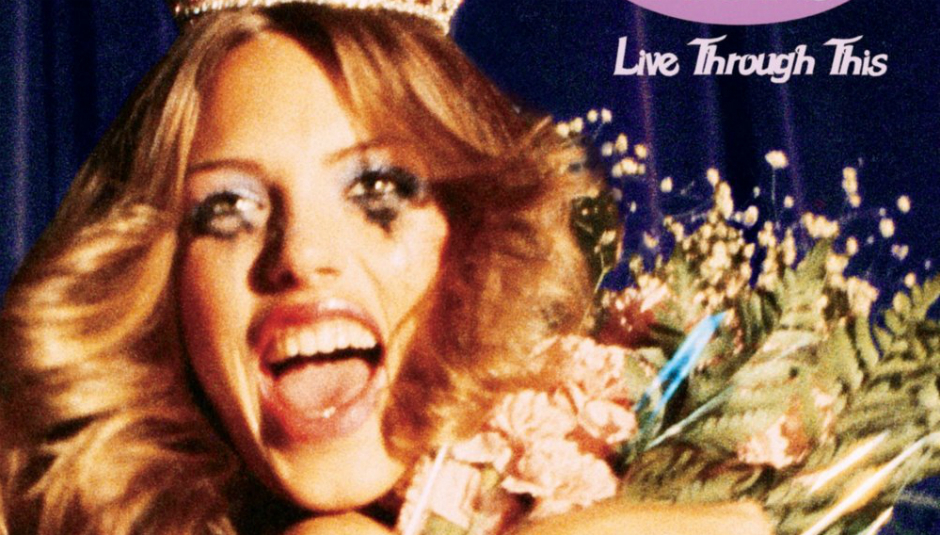Much like Courtney Love’s feminism, Live Through This is messy, loud, and deliberately, aggressively imperfect. Conscious of all the contradictions arising in her ideas, Love relishes them and pushes them all to their extremes, in a way that feels somehow both deliberate and manic (maybe through her total ownership of her mental illnesses). And Love not only refutes but mocks the critics claiming that in doing so she gives feminism a bad name; rather than spelling the end of feminism - “Revolution, come and die” - Live Through This humanises it, anthropomorphises it (gynemorphises it?) completely, then puts it under a microscope. Naturally, for humanity put under a microscope, the results are gloriously grotesque.
With a talent for playing with the pure aesthetics of phrases almost unparalleled, Love crafts imagery throughout Live Through This that rejects the need for quote-unquote female art to be beautiful and instead revels in the gruesomeness both mental and physical of her experience. The recurring imagery of milk in ‘Plump’ and ‘Softer, Softest’ is genius not only as symbolism - which we’ll come to in a bit - but the way it works as beyond graphic. When Love sings “Your milk’s in my mouth / It makes me sick” you can practically taste it; when she sings “Your milk is so sour” you can practically smell it. Elsewhere in ‘Plump’ Love colours her desperate scene with vomit, while throughout ‘Softer, Softest’ she refers to her main character by her odour - “Pee Girl”. A sadomasochistic assault on the senses, her invocation of smells makes the deliberate gruesomeness of Live Through This positively inescapable.
That recurring motif of milk works too as a suitably complex and very telling symbol for how Love views motherhood. ‘Plump’s picture of postpartum depression is by turns despairing, defeated, and fraught, highlighted by milk and baby spit. On ‘Softer, Softest’, Love paints in milk a tragic story of incest and abuse that wrenches your heart as hard as your gut. Intended as a nurturing substance that comes from the mother’s very being, it’s “gone sour” with the mother’s betrayal in failing to protect her daughter, and later it “has a dick”, reflecting the daughter-victim’s fear of her father’s violent masculine power.
For a former sex worker in the early 90s, such tropes of the nurturing female substance and the threatening phallus may seem curiously second wave, or at least essentialist. The imagery deployed throughout Live Through This seems obsessed with a body it understands as “female” (my lil fourth wave hands are twitching as I type). This, however, is not to be read as a deliberate alignment with essentialism as a guiding political ideology; rather, Love’s imagery is intended to be as physical as possible for her desired effect, namely one of shock - partially because, as a cisgender woman, these are the experiences she lives and the tools of expression at her disposal, and partially because these manifestations of femininity are met with disgust, so these manifestations of femininity too may be used to assert an existence that contains within it a fundamental rebellion.
What’s more, the songs of Live Through this very seldom have one singular meaning; part of Love’s lyrical genius, and part of the reason for the album’s appeal being as wide as it is, is her talent for seeing several seemingly unrelated aspects of patriarchy and saying: "Did you ever notice that this looks like this?". The fragments and phrases that make up the songs as coherent, perfect wholes often have multiplicities of meanings that are there to be read from them, and deliberately so. It’s how such a personal album can feel so relatable at the same time. It’s full of moments like that one line in ‘Plump’, a song about pregnancy and postpartum depression, that sounds a bit bulimic. Moments where a line here or a fragment there can just grab you, to let you know it’s there for you too.
Far then from a concept album about her pregnancy and motherhood, the feminism of Live Through This is fiercely multidimensional. And unlike much of the second wave literature it might seem to hark back to, it dissects with equal attention the narratives of young women and girls, perhaps hence the somewhat ironically huge overlap between fans of Hole and Bikini Kill. For despite even ‘Gutless’ and ‘Olympia’ (mislabelled as ‘Rock Star’, a song referencing Cobain that was pulled from the album last minute when he died and was not murdered you boring misogynist cunts) brutally criticising Riot Grrrl, there was a considerable overlap in their themes and even attitudes and ideas. For much of Live Through This is dedicated to the legitimisation and vindication of the numerous pains of young women and girls.
A perfect example of this is ‘Miss World’. Concerns about beauty had been dismissed as petty, childish, and even counter-feminist by the feminisms of previous eras. ‘Miss World’ affirms with rage and despair the destructive evil of beauty that changes depending on your relation to it but never goes away. Sarcastically assuming the tone of the petulant high schooler to satirise the flimsy grounds on which people dismiss this pain, she sings of the victory in beauty that she knows to be pyrrhic as fuck. Her character (portrayed by the iconic cover art) laments that she has sacrificed her own identity, agency, and friends to win the title of ‘Miss World’ (or Miss Congeniality), and her prize is that she gets to be objectified by male desire above her competition - “I am the one you want, can’t look you in the eye”. Being the chosen sex commodity, being used before being discarded, comes at the cost of personhood.
Meanwhile, on ‘Violet’ she sings - screams - of her own consent to being sexually used, and indeed used up. She paints a harrowing picture of the self-fulfilling masochism at that particular extreme of female sexuality, by turns berating herself for her seeming inability to “say no” and revelling in the empowerment of fulfilling her own sexual agency even while recognising its limited, even arguably defeatist nature. This was for all the young girls dizzy with confusion and hurt as we tried and continue to try to figure out how to approach our own sexuality when every answer was wrong (like this excellent writer describes here).
The music of ‘Violet’ reflects perfectly this sense of being physically and mentally torn apart by paradox. In fact, this carries on throughout Live Through This, so ‘Violet’ can be heard musically as well as lyrically as something of a statement of intent. The three chord riff moves from defiance to plaintiveness to a lucid sort of resolve, and throughout the song, the guitars and Love’s vocals take the listener through her contempt, despondency, and pure, unadulterated rage. And throughout the album, the guitar riffs and chord progressions continue to be expressive in this way that is so unique and powerful.
The chord progressions and melodic ideas of Live Through This are often strange and unsettling, making frequent use of chromatic melodies and jarring intervals. On tracks like ‘She Walks On Me’ and ‘Gutless’, as on the Young Marble Giants cover ‘Credit In The Straight World’ that sits so comfortably on the album it doesn’t even sound like a cover, such counterintuitive chord progressions form the main riffs, and the whole song is structured around them, only rarely conceding to resolution, keeping the listener as uncomfortable as possible. Yet even on tracks that make full use of Love’s and Erlandson’s genius pop sensibilities, there is almost always a chord here or a chromatic note there that jarrs. Most of the riff of ‘Asking For It’ lets you believe it’s going to be a straightforward alt-rock song, only to refuse to let you settle into it by adding a 4# to the otherwise typical subdominant chord. The whole song is thus tinted with a sense of something confusing and sinister. Likewise ‘I Think That I Would Die’ builds a melodic riff on chromatic arpeggios which then grows into an uncomfortable 3b-3-1 chord progression, that colours the would-be comfortable G major chord with a sense of paranoia and self-doubt that reflects the anxiety of the song.
But just as important as the jarring inaccessible element to the music of Live Through This is the pop perfection that makes up most of it. Hole’s deliberate use of shimmering pop on such a flagrantly anti-establishment record is nothing short of genius. Every pop hook the album uses, it uses with a self-aware sense of irony, and yet it enjoys it while it does. The hooks seem just as much to mimic with scorn the sounds of contemporary pop as to deliberately reap their benefits, not simply in equal measures but as two sides of the same paradoxical coin.
And of course, it had to be both pop and grunge, ironic and sincere, relentlessly disdainful and impossibly tender. The album reifies this typical female experience of which there is not one. It affirms, legitimises, vindicates such a plurality of women’s experiences that no matter the specificities of your femininity, it can be “your” album. And it exemplifies both the mess and the magic of women talking about their experiences like they matter. In every way both mess and magic in equal measures and inextricably linked, Live Through This has its cake and eats it, licking its fingers afterwards.






















